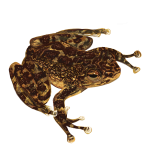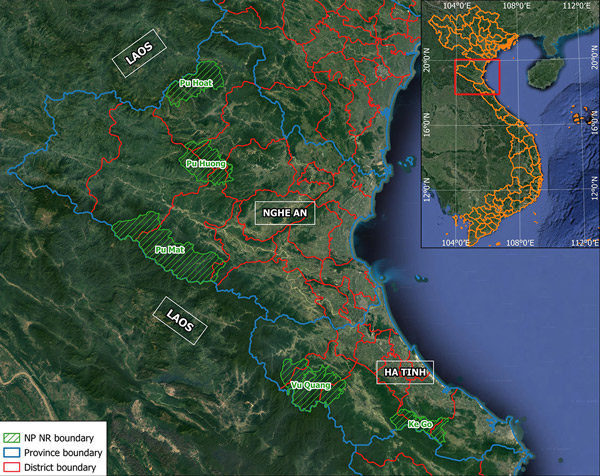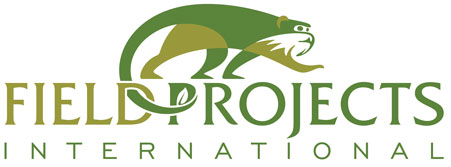Reptile & Amphibian Surveillance – Vietnam

Participate: Reptile & Amphibian Surveillance - Vietnam
Applications Closed
Stay tuned for the next program announcement!

Quick Facts
- Timing: TBD
- Duration: 2 weeks
- Location: Nghe An Province, Vietnam (beginning and ending in Hanoi)
- Application Deadline: TBD
-
Program Fee: $3500 (non-student) / ($2500 student discount)
Fee includes all local transport from Hanoi + food + lodging + training - More information in the FAQ below the program description.
PROGRAM DETAILS
Research and surveys for the past 30 years have documented a rapid change in the fauna and flora of Vietnam. Species of wildlife that were once common are becoming scarcer and this has challenged policy makers, scientists and local communities. Unsustainable exploitation of wildlife populations by rural communities to accommodate high demands from urban areas has reduced biodiversity. Other threats include significant increases in ore mining and associated pollution, which disturbs habitat and can have a major impact on fauna. Wildlife populations may also be increasingly affected by climate change, however there is inadequate data to determine the full extent. There is a need for long-term habitat and animal population monitoring in order to regularly assess the health of Vietnam’s natural resources, providing opportunities to implement behavioral changes or other One Health interventions.
In Vietnam, wildlife surveillance work to date has largely concentrated on targeted mammalian species such as bears, tigers, ungulates, pangolins, and primates. Amphibians and reptiles, with the exception of turtles, have been less well-studied. Herpetofauna are susceptible to rapid changes in temperature, seasonality, and pollution from anthropogenic activities. In addition, small groups of hunters, loggers and collectors of forest products frequently supplement their diets with frogs and occasional reptiles collected from streams around their camps and in natural resource areas. Thus, the status of amphibian and reptile species richness and abundance, or diversity, is a key One Health metric for the Annamese ecoregion.
The overall goal of this program is to collect long-term survey data of natural and disturbed amphibian and reptile communities, which should reflect health and sustainability of the Annamese ecoregion. Routine survey efforts are organized at multiple locations to generate comparative datasets that will differentiate environmental impacts associated with climate change from anthropogenic disturbance. Surveyed taxa will reflect species that are subject to pressure from hunting/poaching activities, and others that are not, both dependent on access to natural habitat and stable environmental conditions. As much as possible, animal survey data will be paired with 1) the collection of environmental indicator variables from soil and water samples 2) non-lethal or non-invasive biological sample collection from target taxa for accurate molecular classification and future pathogen screening possibilities. All samples are transported to Vinh University for molecular research activities as part of with the In Situ Laboratory Initiative.
This program is carried in partnership between FPI and the Institute for the Ecology and Conservation of Nature (IECN), based at Vinh University. Participants will join the field team to carry out a herpetofauna survey at one of our designated sampling locations in the Annamese Mountains. Getting to and from the survey locations involves multiple hours of travel by road, on foot, and sometimes boat. The team will usually stay in or near to a local village for one day before and after entering the survey location. The sampling locations are breathtakingly beautiful but physically challenging. Transect surveys begin at night after dinner (between 5 and 7pm) and may continue until 10 or 11pm. Each transect is 500m long, in a river bed, thus participants should expect to get wet from the waist down – clothing and field gear will be discussed during the interview and in greater detail once accepted to the program.
At each sampling location there are 3 transects, corresponding to different elevations and/or distances from local villages. Each participant can expect to perform a minimum of three night transects with the team, in-between transects will occur data entry, sample processing, eating, relaxing, and travel to subsequent transect sites. Lodging consists of a combination of guesthouses and camping (sleeping in hammocks), and hotels in Vinh City.
This program will provide an enriching wilderness experience in hard to access tropical rainforest within Central Vietnam, detailed training in the collection of herpetafuana survey data, non-lethal and minimally invasive biological sampling, environmental sampling, and cultural and language immersion. We encourage participation by individuals who are interested in research or conservation of natural resource areas and wildlife (amphibian and reptile enthusiasts, in particular), in good physical and mental health, and who can respectfully immerse themselves in a culture that is unlike their own.
Basic itinerary (minor details are subject to change):
Day 1: Pick up at Noi Bai International Airport, travel to Vinh, and attend a welcome dinner with the team.
Day 2: Project coordination with the field team.
Day 3-4: Travel to villages, sampling preparation, and conduct forest transects (day and night).
Day 5-7: Travel deeper into the forest where we will camp. Continue sampling and forest transects.
Day 8-10: Travel to new forest site, set up camp. Continue sampling and forest transects.
Day 11: Travel to local village & debrief
Day 12: Travel to Vinh.
Day 13: Visit wildlife rescue center in Ha Noi
Day 14: Depart from Nihn Binh to home country
Training and skills
By the end of this program, you will have experienced a variety of techniques essential to the study of wildlife, such as biological sampling, sample handling and storage, and data collection.
- Transect survey methodology
- Personal safety and well-being considerations during fieldwork
- Preliminary classification of taxa using morphological characters
- Non-lethal sample collection
- Safe capture and release of amphibian and reptile taxa
- Safe animal handling of amphibians and reptiles (non-venomous snakes)
- Sterile sampling procedure, best-practice labeling and storage.
- Collection and management of animal encounters and health data
We are very proud to be able to provide high-quality research and training experiences to a diverse student body. The following list is not exhaustive and is intended to give an idea of the background of participants who have found great value in this program.
- One Health professionals or trainees.
- Veterinarians, pre-veterinary students, veterinary technicians.
- Students and public health professionals.
- People interested in ecological research.
- Those with a strong interest in biodiversity conservation and conservation genomics.
- Lovers of Latin names and taxonomic identification
We are currently recruiting participants with the following qualities. If you are uncertain if you are eligible don’t rule out the program, please contact us to confirm.
Minimum Requirements:
- You must be at least 18 years of age by the time the training program begins (no upper age-limit)
- Two references from sources that can substantiate the participant’s experience and skills
- Must be able to carry at least a 20 lb backpack during field expeditions
- Fluency in basic spreadsheet management via Excel.
- Participants must be in good physical condition, with the capability to walk 5 – 10 miles a day
Preferred Requirements:
- Ideal participants will be biology majors, have taken anatomy- and morphology-based courses, and/or demonstrate a strong interest in natural history.
- Participants will not be discriminated against for medical conditions they might have; we must determine that being on this project will not pose an immediate risk to their health
- Participants must be willing to maintain long hours in the field, with every effort made to balance this across the program.
- Participants must be reliable – when a team is assigned to a task, days of planning go into the execution of the protocol. Carelessness and tardiness on the part of the participant could jeopardize the entire project.
- Participants must be detail-oriented
- Due to the nature of the work and weather constraints, participants MUST be willing to be flexible about their schedules
Principal Investigators
Dr. Gideon Erkenswick
Senior Research Scientist, Field Projects International
Dr. Cao Tien Trung
Director, Institute of Biology, Chemistry and Environment at Vinh University
Frequently Asked Questions
1. Apply online here. You will need a CV/resume and two references.
2. We will invite you for an interview via Zoom if we wish to move forward after reviewing your application
3. If accepted, you will be notified within 1 week
4. Turn in medical info, vaccination record, liability waivers, etc.
5. See you in the field!
Our cancellation policy is:
- 30 days or more before your start date: 45% of the program final fee refunded. Please note that the down payment is not refundable.
Yes, but it would have to be approved by your university, who will also bill you for the credit hours. If approved, there is also an additional $250 fee that serves as a mentorship fee for the FPI senior scientist mentoring you through this project. From there, it is just a matter of coordinating between your university mentor and the FPI researcher.
There are pretty firm minimum requirements for each research training program. These are firm because each participant must be trained, during which time the data they collect cannot be relied upon entirely.
If you have a special circumstance and want to request a shorter program time, you may contact us and we will discuss it with the lead investigators on your chosen project. There is no guarantee, but in the past we have been able to accommodate on occasion.
No, you do not need previous research experience. These are training programs designed for participants at all levels. It can be hard to acquire field experience, so we balance our teams with veteran researchers and those new to the world of field research. We seek bright and enthusiastic candidates with the right temperament to work in this challenging environment.
The cost to participate includes:
- Local transportation in Vietnam – arranged by staff
- Lodging and all meals with the team
- Specialized equipment and supplies necessary to conduct training and research activities.
Program fees do NOT include:
- Any travel expenses prior to arrival in Vietnam
- Health or travel insurance
- Vaccinations or other medical expenses
Peer-to-Peer Fundraising
We are able to offer a peer-to-peer fundraising program for research assistants. Once accepted, you would be able to (optionally) create a shareable profile on our platform. This is a team-based initiative, so half of your raised funds will go toward your own program fees, while the other half will go into pool to be split evenly among all program participants who had at least 5 donors. More details will be available during (and after) your interview.
All participants are required to show proof of medical insurance before joining us in the field. Many travel insurance providers can assist with emergency medical coverage and emergency medical evacuation. Be certain that COVID-19 is covered in your plan.
You will have to provide proof of a normal vaccination record. For travel to Vietnam, we recommend consulting the CDC’s website and your primary care physician.
Find a travel clinic and get your shots EARLY.
A fully independent research project is not feasible in this program due to time constraints, as well as the fact that all research projects must be sanctioned by the field station, approved by an IRB/IACUC, and have the required permits from the relevant government agencies in Vietnam. All of our research projects have obtained the necessary approvals and permits, which cover the specific data we collect and how we use it.
That said, some candidates may have an opportunity to win a grant that will fund their program fees and travel, and that grant requires them to submit a research proposal. If this is your situation, we may be able to work with you on a proposal. You can contact us at info@fieldprojects.org and let us know your situation. Then after you officially apply to the program, you can discuss this in greater depth with one of our senior scientists.
We cannot accommodate completely independent projects, but we can assist you with finding a subset of our samples or data that has not yet been fully analyzed, which you could potentially develop further under our supervision.
Yes, you can. We do not give co-authorship for collecting data alone, but we offer interested students the opportunity to work on data analyses after the summer research program, that could lead to co-authorship in the future. Many of our former field team members have gone on to become research collaborators.
The first signs of suspected symptoms or a temperature above 100 degrees Fahrenheit should be reported immediately to the team leaders. They will have protocols for isolating symptomatic people, arranging viral testing, notifying those you have been in contact with, and evacuating you to the nearest hospital if necessary.
(Note that travel to a hospital and any care there is at your own cost; make sure your insurance policy covers this.)
Other symptoms/illnesses are handled on a case-by-case basis. Prior to your departure, and during your travel to Vietnam, you should stay as socially distanced as possible to avoid becoming sick. Avoid others, wear a mask, and wash your hands regularly.
Location: 443 Old Via Rancho, Escondido CA 92029
Phone: +1 (314) 649-8636

